Today, for the first time in months I am on my own.
I realise that others, on their own for months, might see this as no cause for celebration. The space and isolation can feel as oppressive as constant contact and noise.
Our need and preferences for space vary so much. Too much and we feel lost, alone. Too little and we feel cramped and irritable. And the ‘right’ amount can differ depending on our mood at the time.
I started this blog intending to write about the value of spacing out copy for better readability. I know, you can barely withhold your excitement right? I’ll get to it. But first please bear with me as I amble into a more philosophical terrain for a few paragraphs.
Space matters for all sorts of reasons
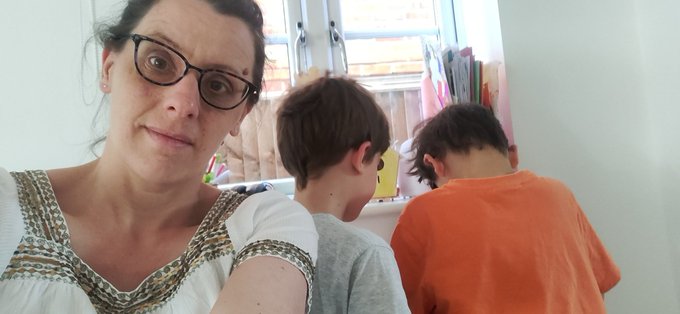
Why use another room when you can stand in almost exactly the same place as your parents?
This is me. Lockdown chic at its best. I was trying to work at the time, and for a reason known only to themselves, my kids decided they would use the tablet in the same square metre as me. I know other parents (of kids and pets) can relate. Indeed, another friend sent me a very similar picture of her two kids pretty much sitting on top of her as she tried to relax for a few minutes.
Children love this lack of space and close contact. Indeed, it’s known that mammals need to be cuddled. It builds up our bodily systems, reduces stress and helps us sleep. I remember crowding my parents as a child – a mark of dependency we become keen to lose as we enter those teenage years. I try to remind myself that one day these moments of full-on physical affection will stop and to enjoy them – as much as that’s possible – while they’re still a feature.
This lack of space and the constant noise has felt wearing. But as I pad around my newly empty home, I feel alone. As if someone turned the volume down unexpectedly. It’s not the release I hoped it would be.
Space can absolutely feel like a bad thing. A new space at the table. An empty bedroom. An unslept-in side of the bed. It can be easy to forget – for a moment or two – that you’ve lost someone. Then the extra space reminds you. Perhaps for a fleeting instant, you hear or catch a glimpse of that precious person. But no… there’s nothing but space.
Space to think
We’ve been encouraged to think of the sudden presence of space in our towns and cities as a good thing. As a sign of our respect for one another and our love for one another. By staying home and staying safe we were helping one another and helping the country.
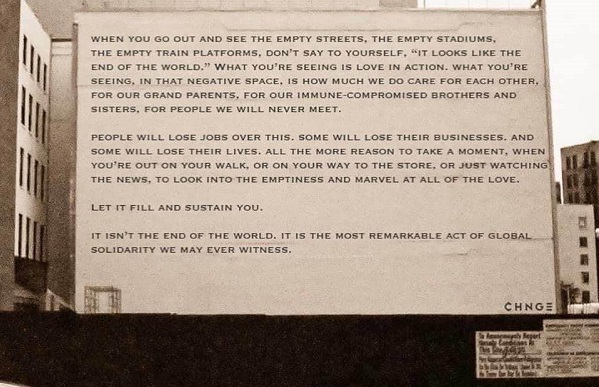
Quite what this means for the ones To Whom The Rules Do Not Apply as they drove to ageing parents and family members many miles away we can only speculate. Their insistence that rule-breaking was acceptable because it was done with integrity has been questioned enough.
Space can feel ridiculous. We step into the road to avoid walking to close to others. It feels like contemporary dance. As if we’re choreographing our public lives. “Yes of course I’ll stand against these nettles so you can walk past”. We Brits have embraced this distancing with surprising ease.
But now we also pull our children back as they cheerfully run near to others. It gets me every time. What are we doing to our kids? Will this constant talk of “don’t get close” backfire? How will they build relationships as teens and adults if leaving a gap between one another becomes habit? Perhaps it will become the teenage rebellion of future years. Flouting social norms by grouping together, standing near others, sitting on the lap of someone you don’t know.
The final frontier? No thank you
And then there’s Elon. I feel as if I am one of the few people who couldn’t give a monkey about his mission into space. There seem to be so many more Earthly matters to contend with. And honestly, I couldn’t think of anything worse than going into space. For one, I can’t get past the irony of the situation. People are paying to be blasted off our beautiful planet into an environment that’s so vast it’s called “space”. All the while, they’re shut into a room no larger than my office (and believe me, that’s small) with several other people.
Crikey, I’ve gone on a bit, haven’t I? Onto more writerly matters.
Space matters when you’re writing.
Clumping everything up into one big paragraph turns what could be inspiring, motivating or amusing into a verbal scrummage.
How can you get your message across when the reader doesn’t know where the important points are?
Listening to comedians emphasises this brilliantly. A good comedian always pauses to let the audience get the joke. It’s their paragraph break. Their white space. Listen to the audience’s reaction. Initially, they titter politely. And then, when they fully comprehend the joke, they roar with laughter.
This is a great excuse to get Phoebe Waller-Bridge into my post. Her silence – the space – whilst talking about genitals (yes, that’s what I meant to write) is all the more hilarious because of her silence. She lets her audience fill in the gaps and appreciate what she just said. It’s at around 4.30 minutes into the reel if you’re interested. (And I know you are.)
Another reason that space matters when you’re writing.
I’ll fully confess to having lost some of my mojo recently. Can you relate? The uncertainty, stress and claustrophobia took their toll. Creativity isn’t something you can just drum up. You need to nurture it. And for me, that means time alone.
A walk, a soak in a bath or shower, even plodding through the washing up. They all work for me and give me time to reflect and get lost. To make those creative connections and answer the voices in my head. Having space to myself again gives me the opportunity to create better writing with less work.
It’s a more efficient and joyful way of working.
Six ways you can use space to improve your writing:
On a page/screen:
- Use paragraphs. Stick to one idea per paragraph to help your reader distinguish between your ideas and messages more easily.
- Make your paragraphs shorter. If your paragraph is more than 4 or 5 sentences long, there’s a chance you’re getting carried away. Stick to the point and move on.
- Increase the space between your lines. You can choose how much space you have between your lines and paragraphs. Increasing the amount of space can make your text easier to read and digest. Cramming it together so it fits into a pre-determined space is offputting for your reader.
As a person:
- Find your happy place. Able to write in a cramped, noisy location with lots of people around you? Good stuff. Most writers need SILENCE, and that tends to mean their own space. So whether that’s an office of your own, a table in a library or even a seat in a bench, find the space you need to write.
- Finding it difficult to get enough silence? Try binaural beats. They stimulate your brainwaves to help fuel creativity and concentration. Whether they do it for you or not is another matter, but I have found them helpful in the past.
- Give yourself permission to enjoy nothing. Great things happen when your brain doesn’t engage in the “stuff” that surrounds us. Opt-out of your podcast on your next walk. Drive with the radio off. Put your phone away next time you’re waiting for someone. Instead, let your brain find the space it needs to create connections and ideas.
Helpful? Or a waste of space? Let me know what you think and tell me how you use space in your everyday life.
Three Surprising Things I Learnt When I Went Freelance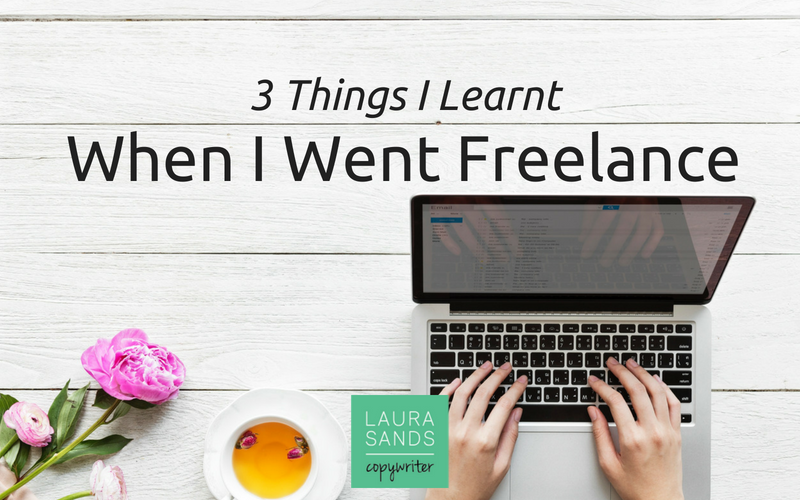 Time flies whether or not you’re having fun, so I figure you may as well make the time you have count.
Time flies whether or not you’re having fun, so I figure you may as well make the time you have count.
Three years ago, I was working out my notice in a blue-chip multinational. I was also studying at night to retrain as a copywriter whilst looking after a 3-year-old, 2-year-old and (let’s face it) a husband. I was leaving behind the security of a good salary, health, life and dental insurance as well as the chance to wear good shoes everyday. Was going freelance really the right decision?
With three years’ experience under my belt, I’ve had my ups and downs. But I can honestly say I love my freelance life. But it’s not for everyone, and here are the things I’ve Iearnt:
A lack of accountability to others isn’t actually that great…
Working for yourself is so relaxed. You can meet friends for coffee, sneak in a cheeky massage, weed that flower bed that suddenly looks so overgrown.
But if you want to grow your business you need to pull yourself together and snap out of that approach. It’s way too easy to get distracted, procrastinate and focus on the wrong things, especially if you lack the confidence in your plans or ability to do what you need to do.
It’s incredibly helpful to set yourself up with a mentor, coach, or other form of accountability network. Someone to keep you on track and make you do what you said you were going to do. I was lucky enough to do a skill swap with a friend who was training as a coach. She coached me; I wrote blog posts for her family business. She helped me identify and start to resolve my incredible ability to procrastinate and made me tackle some of my deeper issues around self-doubt and confidence. She was also a brilliant sounding board who made me take things easy when I was beating myself up about not getting enough business and spurred me on to attend networking meetings that I dreaded the thought of.
I’ve learnt to treat office hours as if I were in a real office sitting with a team. Would I take that personal call if I had colleagues around me? No of course not… Would I come in late because I fancied a coffee after the school run? Only if I wanted to get fired…
Invest in yourself; no-one else will
Now the buck stops with you, you need to invest in yourself properly. In my early days, I overdid it. Once I’d got over the three-day migraine that comes with a poor diet, too little sleep, and not enough exercise, I wrote myself a “charter” to stay on top of things. First on that list was taking care of my health. I reasoned if my health went, I wouldn’t do my best work, my family wouldn’t get the best of me and I’d feel miserable. It’s hard to stick to, especially when you have kids to look after, but I work hard to prioritise my health. I know I’ll never manage a pre-breakfast meditation, but there are other things I can do.
I take a pilates class every week to look after my back and neck. I drink plenty of water, avoid caffeine after 1pm and try to have something other than cheese on toast for lunch every day. I also try very hard not to attack the kids’ chocolate supplies when I’m running low on inspiration and blood sugar. I invested in a very good office chair have set up my desk for good health with ergonomically placed screen and keyboard and plenty of houseplants around me. The result? I feel healthier, I enjoy my office time and I’m much more productive.
But investing in yourself goes further than physical self-care. There’s no-one to keep an eye on your professional development or mental health when you work freelance, and a year or so in, I found myself becoming quite isolated. It’s very easy to tap away on your laptop, go onto Twitter and pretend you’re interacting with people. An impulsive acceptance to a conference was just what I needed to realise the value of professional development in staying fresh and relevant. Professional interaction is also crucial for your mental health – networking has a low appeal for me (small talk and I don’t get on), but when I make the effort, I feel better for it. Speaking to others in your situation creates a sense of camaraderie. It also opens the opportunity for potential new work. What’s not to like?
You have to stay in touch with your original motivation
Everyone has a different motivation. Some people want to be millionaires. Others just want to cover the bills. I wanted financial reward, to be professionally challenged and the opportunity to enjoy time with my children. It’s a combination that can be tricky to realise…
I use my flexible hours to my benefit and help at school one afternoon a week, listening to children read. It’s a small thing but means a huge amount to my kids and the kids I listen to. It’s also one of the most amusing parts of my week. Kids speak truthfully and come out with the funniest things – it’s a real mood lightener. I clear my books over half-terms and holidays, just sticking to regular work for my long-term clients who know and understand the deal. Holiday club is an option for that “can’t refuse” project, but I’d rather enjoy the time with the kids while I can… in 15 years they won’t have the time for me, I’m going to get my fun time in now!
Charging enough can be a struggle when you go freelance; too many people expect you to be happy to do the work for next to nothing, something reinforced by companies such as Fiverr. I did too much work for too little in my early days and know pricing appropriately is a challenge for most freelancers. I’ll be honest, it’s the part of my business I continue to struggle with the most, but with resources like the ProCopywriters network helping champion a realistic rate for copywriters, I feel like I’m getting closer to where I should be.
A lack of professional challenge was a part of the reason for me leaving my old career, but there’s plenty in my new freelance life. With the admin and legal side of managing a business (dare I mention GDPR?), relationship management with a variety of clients (all good by the way), and meaty projects that stretch my skills and teach me new things, I’m learning every day.
Freelancing. Is it for you?
Freelance working isn’t for everyone. It can be isolating, bad for your health and financially disastrous if you plan badly. But it’s liberating and incredibly rewarding when things go in the right direction. It’s undoubtedly hard work, but then if it wasn’t – everyone would be doing it, and where’s the fun in that?
This post was originally posted on Talentedladiesclub.com in May 2018. You can read the original article here.
The beautiful photo in my header image is by rawpixel on Unsplash.
Want to write a bad email? Start like this…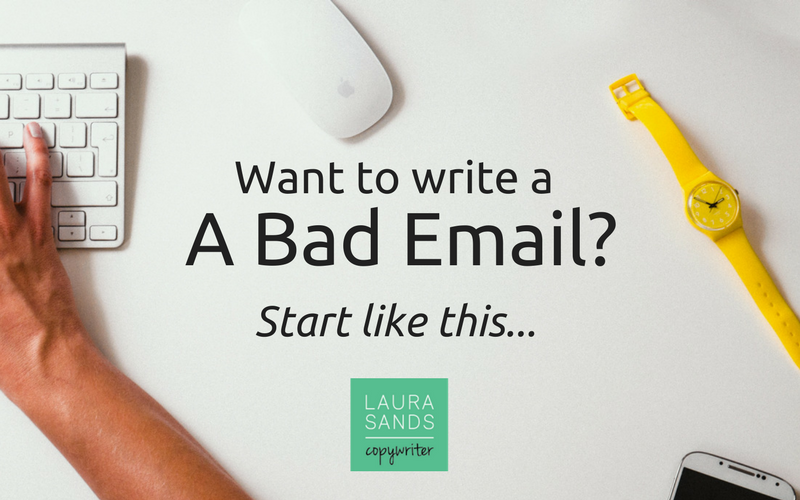 It slips off your tongue easily and finds its way off your fingers and onto a keyboard even more easily. But kicking off with an apology is one of the fastest ways I know of starting an email on the wrong foot.
It slips off your tongue easily and finds its way off your fingers and onto a keyboard even more easily. But kicking off with an apology is one of the fastest ways I know of starting an email on the wrong foot.
Sorry. Forgive me. My apologies. Whoops-a-daisy. My bad.
You get the picture.
Why you shouldn’t start with sorry
The person reading your email will be ready to wonder what you’ve done. Should they feel aggrieved? Impatient? Irritated? You’re certainly suggesting they have a right to be. As we humans are highly suggestible there’s a chance that even if they weren’t aware of the wrong you’d committed, and couldn’t have given two hoots, they may be a bit less than impressed with you than they were 10 minutes previously.
An example…
Let’s say you’ve sent something a bit later than promised. Train delays, kids off school, cat to the vets with a mystery cough… life happens. You finally whizz off the email to your contact, starting with an almost out of breath “sorry this is so late…”.
What’s the first thing the recipient thinks? “urgh… late again”. They sigh as they sip their coffee and add a little black mark against your name in their imaginary list of “people I deal with”.
If you were just an hour or so late, you’d have been better not mentioning it at all. There’s a chance they hadn’t even realised your note was late. If you were over a clear deadline or a day or so late, you could replace an effusive apology with a more assured “thank you for your patience…” – a trick you might have seen elsewhere.
Thank you for your patience
It’s something doctors say, you’ve probably heard it before…
You’ve been waiting in a stuffy waiting room with only copies of the “People’s Friend” for entertainment. It’s been 45 minutes and you’re ready to create merry hell. The doctor eventually calls you in and says “thank you for your patience”. They may even explain why they’re so over their schedule. Because your doctor is lovely and you know they do a good job, you readily forgive. After all, you don’t mind being patient do you?
Instead of apologising for a small and understandable deficiency on their part, the doctor praises you for a positive behaviour. It’s a small thing, but it makes a big difference to the way you feel. “Thank you for your understanding” works just as well. You make people feel good about their behaviour, shifting the emphasis off yourself. But sometimes this isn’t appropriate; perhaps a big fat “sorry” is in order.
When the situation demands an apology.
You don’t need me to tell you this. In situations that require an apology, you should say sorry.
But you don’t need to start your email with an apology. Get into the solution, help resolve the situation. Something along the lines of “I see what has happened. I’ll get back to you with XYZ by lunchtime tomorrow”. Then add your apology.
In fairness, if you’ve made a mistake that demands an apology you probably need to get on the phone and talk it through. But because you’ll be following up that phone call with an email as well, you need to remember to think carefully about how and where you place that necessary apology.
Sorry? What was that?
Say sorry. Show sorry. But start an email with a “sorry”? There’s never any need to do that.
Do you agree? Or not? Let me know.
Five Things I Learnt from #StoryPower 2018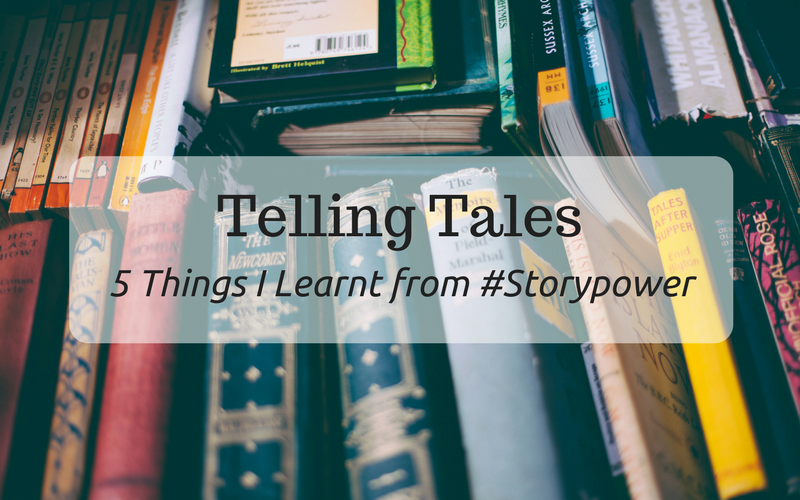 I’m normally restricted to the company of my needy cat and delivery drivers who need me to sign for various parcels, so the thought of heading into London for a conference was exciting. And no ordinary conference – one that promised to help me grow as a copywriter thanks to the “Power of Storytelling” hosted by the behavioural research agency “Watch Me Think”. And with the added happy anticipation of an evening’s romance (the 9-year wedding anniversary for myself & Mr Sands), I headed into town for some professional development.
I’m normally restricted to the company of my needy cat and delivery drivers who need me to sign for various parcels, so the thought of heading into London for a conference was exciting. And no ordinary conference – one that promised to help me grow as a copywriter thanks to the “Power of Storytelling” hosted by the behavioural research agency “Watch Me Think”. And with the added happy anticipation of an evening’s romance (the 9-year wedding anniversary for myself & Mr Sands), I headed into town for some professional development.
I learnt lots from #StoryPower. Much more than I can reasonably cram into a blog post. So what follows are my favourite five takeaways. As it turns out, #StoryPower was the highlight of my day – the wedding anniversary romance didn’t quite live up to expectations, but more on that later…
Numbers Are The Lazy Route
Ouch! I’m certainly one of those people who believes in the power of a good fact or statistic, so this point made me sit up and listen. (I weakly defend myself with the excuse of it being a hangover from my time in corporate marketing where dropping a good margin % figure into a presentation gave you rockstar status). But this compelling talk from Anthony Tasgal made the point that “numbers numb us, while stories stir us”. We should take the time to move our audiences, tap into their desire for connection and debate. We can still use the fact of course, but should take the time to build a story around the numbers and make our audiences feel happy, satisfied, vindicated…
Compelling Writing is Child’s Play
Two brilliant minds presented on a similar theme – reawakening the child that still hides deep inside us. Vicki Perrin of BBC Radio2 works with the 500 Words children’s writing competition, whilst Emily Murdock is part of the grandiose-sounding Ministry of Stories who front their children’s writing charity with the intriguing and involving Hoxton Street Monster Supplies. Details of the imaginative products on sale in the Hoxton Street Monster Supplies including Tins of Fear – you can choose between “Escalating Panic”, “Mortal Terror” or (a regular in our household) “A Vague Sense of Unease” – spiked the room with creativity. Vicki’s touching talk brought to life the importance of running with our imaginations, and not hampering our stories with the shackles of grammar, spelling and convention. A lifting alternative to a line regularly attributed to Hemmingway “write drunk, edit sober”, this encourages us to “write like an 8-year old, edit like a 38-year old” (substitute the decade for your age of choice…).
Tom Cruise Can Help You Become a Better Writer
Stuart Chapman from Lego shared an approach to storytelling that I love. He calls it the “Tom Cruise Skill Level Over Time” method.
Stuart pointed out that pretty much all Tom Cruise films follow the same pattern – he starts out as a decent guy doing OK. He then has a crisis of confidence and loses his ability to do what he was doing. He then meets a beautiful woman who helps him rediscover his mojo. He then goes on to become even better than he was before and saves the day. It’s amusingly accurate – think Top Gun, Jerry McGuire, Jack Reacher…
It’s a clever way to build up a story about your services. By creating an element of doubt (the crisis of confidence) in your reader, you can then go on to be the beautiful woman who can help your reader become even better and “save the day” (or something like that).
It’s Clever to Look Silly
Richard Shotton shared something that many of us unconsciously already knew – people are more appealing when they admit or exhibit flaws. It’s known as the “Pratt Fall Effect”, and essentially tells us to revel in our disadvantage. Few companies do this – inadequacies are a pretty scary thing to admit to after all. But the Pratt Fall Effect tells us if we pretend perfection, we’re less likely to be considered. Listerine is a great example of a product that wallows in its poor flavour, whilst Hans Brinker is a chain of hotels renowned for self-confessed terrible customer service.
But by admitting to flaws, these brands and companies prove their honesty and add believability to their other claims. People are wily; they will always assume you or your product have a flaw. If you leave the deductions up to them, they may well believe the flaws are something you’re actually quite good at.
It takes courage to go down this route, but I’ll be thinking of using this tool occasionally. Certainly for myself (when I get round to it) and possibly for brave clients who are up for some gentle safe-denigration.
Honesty is The Best Policy
A neat segue from the previous point, Ian Leslie talked about the importance of honesty. Not just from a legal and defamatory perspective, but from the angle of tapping into the hidden truth – Hemmingway (yes, him again) said we should “write hard and clear about what hurts”. And it’s the truth – if what you’re writing about feels uncomfortable in some way, it probably needs to be said. Your emotions carry across the page (“no tears in the writer, no tears in the reader” – as said by Robert Frost). We respond to stories that are fundamentally truthful – and so should use this to our advantage.
#StoryPower spoilt us with beautiful stories, witty anecdotes and stirring tales. I was moved to tears on more than one occasion – special mentions to Vicki Perrin, Daniel Meadows and Asif Noorani for that. And a huge thank you to the lovely lady who gave me a tissue when I could barely hold back the snuffles after watching the opening scene in “Up” in Asif’s presentation.
And what about the wedding anniversary romance? A non-event I’m sad to say. I returned home full of romantic anticipation to a husband with extreme man flu. We had fried egg & oven chips for our anniversary dinner and he was in bed by 8.30. Romance may not be dead, but it certainly has the lurgy right now.
Do you enjoy a good story? And what are your favourite ways of using stories to involve your readers and create a connection?
